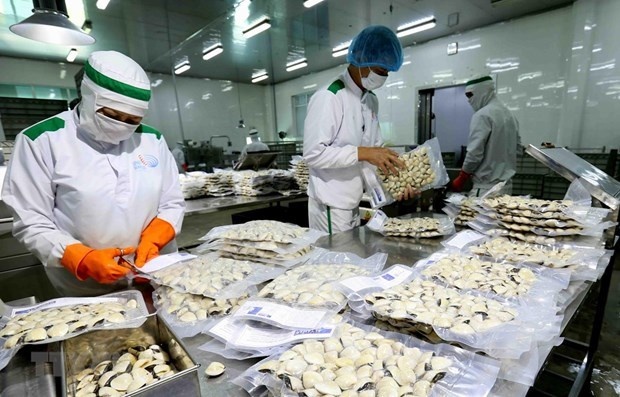Action urged to lighten the load for seafood groups
 |
| Illustration photo. Photo: VNA |
On August 28, the government issued Resolution No.97/NQ-CP to support power tariff and electricity bills reduction for seafood processing enterprises, vegetable processing enterprises, and export manufacturing enterprises with a 2020 export turnover of more than $1 billion each.
The conditions to receive the reductions involve operational production facilities located in cities and provinces which are implementing social distancing. Accordingly, eligible businesses will enjoy a 10 per cent power tariff discount before tax on bills within three months in invoicing time from September to the end of November.
“The pandemic has caused heavy damage to the aquaculture sector. Therefore, we need supporting to maintain production and reinvest,” said Truong Dinh Hoe, general secretary of the Vietnam Association of Seafood Exporters and Producers (VASEP). “Reduction of electricity bills will support the recovery of the chain of production and export.”
Previously, the Ministry of Planning and Investment also proposed that the government should support a maximum of VND15 billion ($660,500) for an aquaculture project to build infrastructure; and a maximum of the same amount for enterprises with ships providing fishing logistics services.
Commenting on the aid, a representative of Sao Ta Foods JSC appreciated the government’s concern. However, he told VIR, enterprises need even more help to keep up with the pace of operations.
Sao Ta Foods is amongst a modest number of seafood producers that still maintain operation. The representative said that although its factories in the Mekong Delta province of Soc Trang are running, workers in affected areas are not allowed to go to work, so Sao Ta cannot reach its normal capacity.
“Our factory is located in a safe zone in the province so we are allowed to continue production. But our capacity will only be 80 per cent of the usual because we lack workers. Moreover, to ensure safety, the factory has to carry out medical tests for at least 20 per cent of its workers every three days, which adds more costs,” he said.
Meanwhile, Thuan Phuoc Seafoods and Trading Corporation based in the central city of Danang is struggling with high testing costs while its factories’ operation only works at 30 per cent capacity.
“If the factories are not working at full capacity, production costs will be much higher than usual. Our desire is to ensure all of our workers get vaccinated to keep up with production and reduce costs,” Le Thi Minh Thao, deputy general director of Thuan Phuoc Seafoods and Trading Corporation said.
She said that seafood producers need more support such as on bank interest rates and union dues. “It is good if social insurance agencies can help us pay wages to underemployed workers in lockdown areas. Furthermore, we are bearing a high social insurance fee, so it is useful to spend accumulated insurance funds to support us,” she added.
Statistics from VASEP showed that, in August, only about 30-40 per cent of seafood producers in the southern provinces were operating with less than half staff, causing the average production capacity reduced to 40-50 per cent compared to previous months.
Also, VASEP forecast that seafood exports in September will continue to decrease by at least 20 per cent to about $660 million in value. After September, if enough workers are vaccinated and producers can return to normal production, exports in the last three months of the year will recover slightly and could achieve $8.5-8.6 billion.
Phung Duc Tien, Deputy Minister of the Ministry of Agriculture and Rural Development, highlighted that if current burdens are not solved, seafood producers will have to deal with human resources issues when they return to close-to-normal production.
He said that the ministry is closely coordinating with related parties in order to grasp the difficult situation of these enterprises and help them maintain operations, while avoiding production chain disruptions. It has also proposed that the government coordinates in clearing obstacles as well as creating more favourable conditions for the production, processing, circulation, import, and also export of aquatic products.
What the stars mean:
★ Poor ★ ★ Promising ★★★ Good ★★★★ Very good ★★★★★ Exceptional
Related Contents
Latest News
More News
- Vietnam sets ambitious dairy growth targets (February 24, 2026 | 18:00)
- Masan Consumer names new deputy CEO to drive foods and beverages growth (February 23, 2026 | 20:52)
- Myriad risks ahead, but ones Vietnam can confront (February 20, 2026 | 15:02)
- Vietnam making the leap into AI and semiconductors (February 20, 2026 | 09:37)
- Funding must be activated for semiconductor success (February 20, 2026 | 09:20)
- Resilience as new benchmark for smarter infrastructure (February 19, 2026 | 20:35)
- A golden time to shine within ASEAN (February 19, 2026 | 20:22)
- Vietnam’s pivotal year for advancing sustainability (February 19, 2026 | 08:44)
- Strengthening the core role of industry and trade (February 19, 2026 | 08:35)
- Future orientations for healthcare improvements (February 19, 2026 | 08:29)

 Tag:
Tag:




















 Mobile Version
Mobile Version